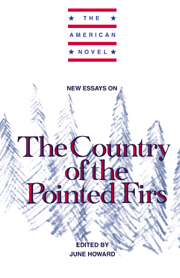Book contents
- Frontmatter
- Contents
- Series Editor's Preface
- 1 Introduction: Sarah Orne Jewett and the Traffic in Words
- 2 Country's Portrayal of Community and the Exclusion of Difference
- 3 Gender and American Realism in The Country of the Pointed Firs
- 4 Material Culture, Empire, and Jewett's Country of the Pointed Firs
- 5 Regionalism and Nationalism in Jewett's Country of the Pointed Firs
- Notes on Contributors
- Selected Bibliography
4 - Material Culture, Empire, and Jewett's Country of the Pointed Firs
Published online by Cambridge University Press: 08 January 2010
- Frontmatter
- Contents
- Series Editor's Preface
- 1 Introduction: Sarah Orne Jewett and the Traffic in Words
- 2 Country's Portrayal of Community and the Exclusion of Difference
- 3 Gender and American Realism in The Country of the Pointed Firs
- 4 Material Culture, Empire, and Jewett's Country of the Pointed Firs
- 5 Regionalism and Nationalism in Jewett's Country of the Pointed Firs
- Notes on Contributors
- Selected Bibliography
Summary
AT the end of The Country of the Pointed Firs a number of Bowden reunioners eat “a model of the old Bowden house made of durable gingerbread.” They have already devoured an assortment of pies on which “dates and names” have been “wrought in lines of pastry and frosting on the tops.” Then, as the narrator explains: “There was even more elaborate reading matter on an excellent early-apple pie which we began to share and eat, precept upon precept. Mrs. Todd helped me generously to the whole word Bowden, and consumed Reunion herself” (p. 108). This feast of language near the end of Jewett's text is very important in a book about a modern woman writer finding renewal and nurture in a matrifocal community. The consumption of words baked and frosted by women fuses the realms of literary art (language) and domestic arts (cooking); it says that connection, rather than division, is possible between ambitious modern women writers and their maternal forebears. But why do they eat the house?
One way to think about The Country of the Pointed Firs is as a material history. From this point of view, Jewett's story seeks to recover and understand the past through serious contemplation and representation of the texts of daily life: the objects, structures, rituals, and landscapes that people shape and are shaped by. Rather than search tomes and archives to create history, the material culturalist goes into the field and examines the ordinary artifacts of daily life.
- Type
- Chapter
- Information
- New Essays on The Country of the Pointed Firs , pp. 81 - 100Publisher: Cambridge University PressPrint publication year: 1994
- 15
- Cited by

